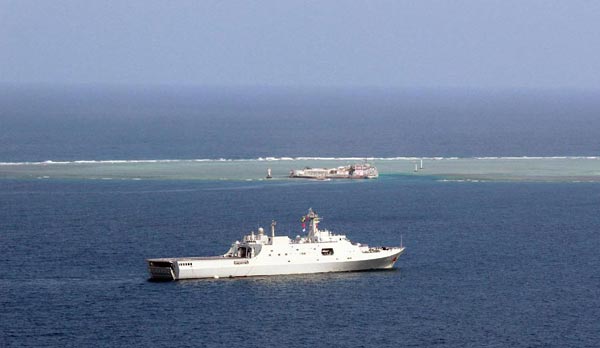


In order to cope with U.S. reconnaissance, which poses a challenge to China's sovereignty and national security, China should institute regular patrols in the South China Sea, said military expert Liang Fang in an interview with People's Daily Online.
According to a report on the BBC, two Chinese fighter jets conducted an "unsafe" interception of U.S. aircraft EP-3 in international air space over the South China Sea. A report on Xinhua said that a U.S. EP-3 aircraft conducted a close reconnaissance mission near Hainan Island on Tuesday.
China's Ministry of National Defense told People's Daily Online that they saw the report, and that this incident might be related to U.S. military reconnaissance around China. The ministry plans to perform an in-depth evaluation of the incident.
Liang questioned the U.S. story about China's interception in international air space, saying that aircraft from all countries are allowed to fly in international air space, and China's military aircraft have never intercepted another aircraft in international air space before.
Liang believes there is a good chance that U.S. reconnaissance aircraft were too close to China's air space, or that they perhaps entered China's exclusive economic zone, both of which could have led to China's interception.
Two Chinese fighter jets safely tracked and monitored the aircraft, said Hong Lei, a spokesperson from China's Foreign Ministry. Hong added that the Chinese jets kept a safe distance from the U.S. aircraft.
According to previous reports, U.S. Navy destroyer USS William P. Lawrence sailed in waters near islands and reefs in the South China Sea on May 10 without seeking permission from the Chinese government. In addition, USS Lassen entered waters near Zhubi Reef without the permission of the Chinese government in October 2015, and USS Curtis Wilbur sailed within 12 nautical miles of Zhongjian Island without prior notification in January 2016.
Liang said that it is more or less typical of the U.S. at this point to conduct close-in reconnaissance in the South China Sea. China will never allow the U.S. to treat the South China Sea as public waters, nor will the U.S. be allowed to deploy ships and aircraft to the area, Liang added.
In Liang's view, the U.S. treats the South China Sea as part of its rebalancing strategy in the Asia-Pacific, and in doing so attempts to incite other countries to oppose China. Meanwhile, the U.S. wants to promote militarization in the area. To cope with these provocative actions, Liang suggested that China consider expanding patrols in the South China Sea.
 French girl ties the knot with Chinese boy
French girl ties the knot with Chinese boy Beijing Style: ready for bare legs
Beijing Style: ready for bare legs Century-old station sees railyway evolution
Century-old station sees railyway evolution Enthusiasts perform Kung Fu at Wudang Mountain
Enthusiasts perform Kung Fu at Wudang Mountain Stunning photos of China's fighter jets in drill
Stunning photos of China's fighter jets in drill Monk's mummified body to be made into a gold Buddha statue
Monk's mummified body to be made into a gold Buddha statue Former Chinese solider of the French Foreign Legion seeks wife online
Former Chinese solider of the French Foreign Legion seeks wife online Asia's longest and highest suspension bridge to open to traffic
Asia's longest and highest suspension bridge to open to traffic China's first interactive robot looks like a beauty
China's first interactive robot looks like a beauty Top 20 hottest women in the world in 2014
Top 20 hottest women in the world in 2014 Top 10 hardest languages to learn
Top 10 hardest languages to learn 10 Chinese female stars with most beautiful faces
10 Chinese female stars with most beautiful faces China’s Top 10 Unique Bridges, Highways and Roads
China’s Top 10 Unique Bridges, Highways and Roads Hong Kong opposition should seize the moment
Hong Kong opposition should seize the moment Trump’s anti-immigrant rhetoric strikes a chord with Chinese Americans
Trump’s anti-immigrant rhetoric strikes a chord with Chinese Americans China rejects latest US steel measures
China rejects latest US steel measures Is the wage gap between expats and locals a function of the market – or plain old discrimination?
Is the wage gap between expats and locals a function of the market – or plain old discrimination?Day|Week